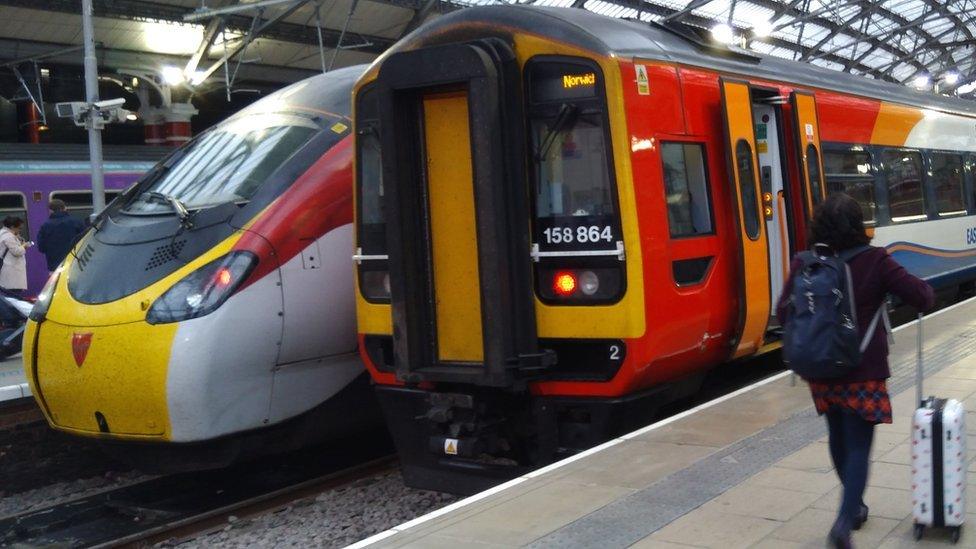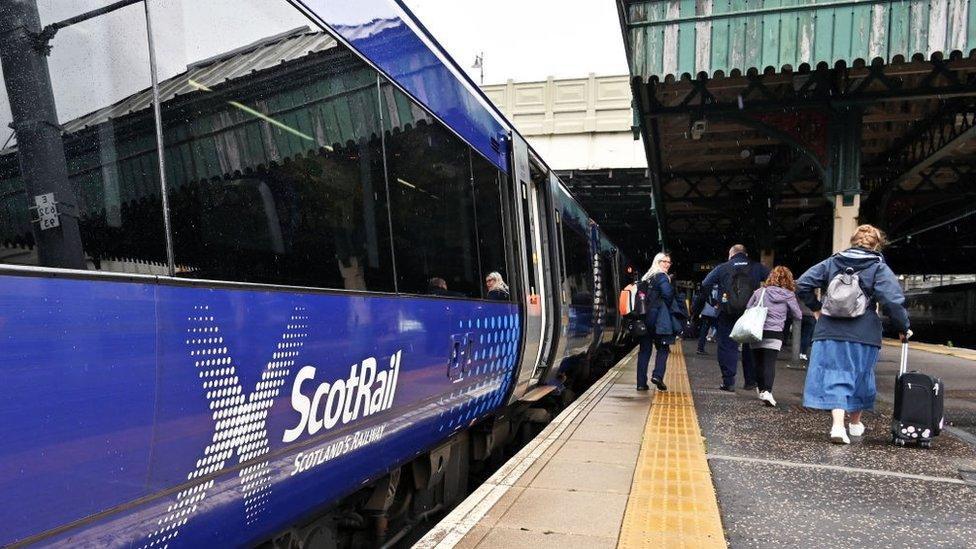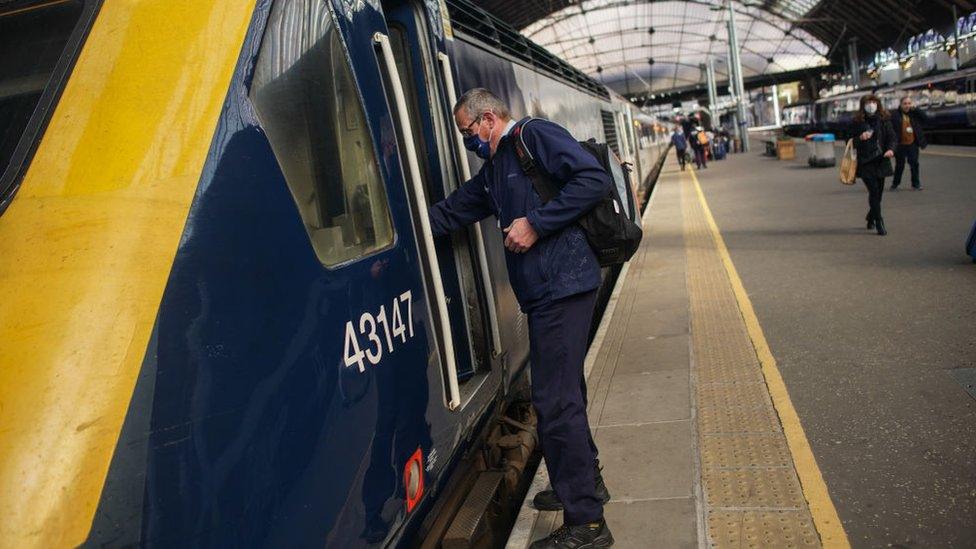Latest Network Rail strikes cut 90% of Scottish services
- Published
Supporters of the RMT union whose members are on strike were ejected from Glasgow Central Station
More than 40,000 rail workers across the UK have begun the first in the latest series of 24-hour strikes.
The dispute by RMT members working for Network Rail does not involve ScotRail staff, but means less than 9% of normal services will operate in Scotland.
The trains running will be on five routes in the central belt, with no services on all other routes.
The walkout by Network Rail staff and 14 train operating companies is part of a row over pay and jobs.
The strikes on Wednesday and Saturday promise to halt thousands of services across the UK as people scramble to find alternative travel arrangements.
Only a fifth of services will run on Wednesday on around half of the network, so passengers are being urged to only travel by train if they must, and if it is necessary, to allow extra time and check when their last train will depart.
Members of the drivers' union Aslef will strike on Saturday at a number of train operators.
Jenny Gilruth tells Good Morning Scotland's Gary Robertson that Grant Shapps must enter negotiations
One passenger who is set to miss a funeral due to the strikes said the disruption "isn't helping me agree with their cause".
Kristian Melson, 30, is an operations manager living in West Lothian, and had hoped to attend his aunt's funeral on Thursday.
Mr Melson will now miss the service in Cambridge as Wednesday's strikes disrupt later trains.
"I am really frustrated that there are more strikes after recent disruption," he said. "I cannot see my family at such a tragic time.
"Most people understand the reasons why (staff) want to strike, we have all felt the squeeze in our finances because of inflation.
"The strikes are highlighting the issues the rail workers are facing but the disruption is angering travellers."

Kristian Melson will miss his aunt's funeral due to the rail strikes
Mr Melson is trying to reduce air travel to improve his carbon footprint, but said flights were too expensive anyway.
"I moved to Scotland knowing that I was only ever four hours away by train," he said.
"My family are all based in the south east so they can go together by car between them.
"They are sad I cannot attend and pay my respects."
Services running
Wednesday's walkout is due to be followed by further strikes on Thursday 18 August and Saturday 20 August.
ScotRail said the railway would only be operational between 07:30 and 18:30 on strike days.
The services that will run are:
Edinburgh - Glasgow via Falkirk High: Two trains per hour
Edinburgh - Bathgate: Two trains per hour
Glasgow - Hamilton/Larkhall: Two trains per hour
Glasgow - Lanark: Two trains per hour
Edinburgh - Glasgow via Shotts: One train per hour
Final services will depart well before 18:30, and customers are being urged to plan ahead to ensure they know when their last train will run.

Scotland's transport minister Jenny Gilruth has called on the UK government to intervene to end the dispute.
And she accused UK transport minister Grant Shapps - who has said it is not his role to intervene - of making the situation "more challenging and more difficult".
Ms Gilruth told BBC Radio's Good Morning Scotland programme: "I very much respect the RMT's positioning in this action. Of course, they are fighting for their members and we had exactly the same actions from Aslef in our recent dispute in Scotland.
"I know that (RMT general secretary) Mick Lynch is really keen to get back around the negotiating table. He wrote to me, and to others, to that effect yesterday.
"It's vitally important now that Grant Shapps instructs Network Rail and the train operating companies to get back around the negotiating table with the trade unions - which is exactly what I did with ScotRail in the most recent dispute - so that we can get to that resolution to reinstate full services and avoid any further strikes."
Tourism impact
The Department of Transport has defended Mr Shapps' stance, saying "it is not his job to bang heads together" and it is down to the parties involved in the dispute to agree a deal.
A spokesperson said: "It is a matter for unions and employers - not government - to engage in meaningful talks on modernisation practices to avoid damaging strike action and prevent chaos on the railways. Government is not the employer here.
"It's important that ministers remain close to the ongoing situation regarding negotiations to ensure that railway staff, passengers and taxpayers are getting a fair deal.
"Industry is offering daily talks to the unions. We encourage the unions to stay at the negotiating table."
The Scottish Licensed Trade Association (SLTA) have repeated their warning that the strikes will have an impact on tourism and hospitality.
ScotRail returned to a full timetable this week, but the strike in England will affect services from London to Scotland. There will also be a negative impact on rail services within Scotland.
SLTA managing director Colin Wilkinson said: "Rail operators have confirmed that they will run just 20% of normal services across only half of the UK network, with trains operating for just 11 hours, between 7.30 and 18.30 BST.
"This means the last services from London to Scotland will leave in the early afternoon, throwing the plans of tourists and people on business into disarray."
He added that the lack of trains would not only put off customers from visiting hospitality, but would also have an impact on staff being able to get to work, with the Edinburgh International Festival, Fringe and other events in Scotland coming soon.
Mr Wilkinson said: "Tourism is getting a boost from visitors from overseas and across the UK but what message are we sending them if they can't catch a train or bus to get to where they want to go?"
Related topics
- Published26 July 2022

- Published9 May 2024

- Published9 June 2022
